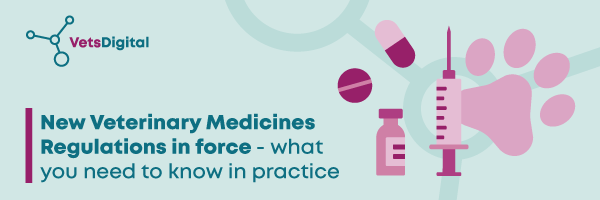News,
New Veterinary Medicines Regulations in force – what you need to know in practice
On 17th May 2024, the laws around veterinary medicines in the UK were significantly updated – and while most of the changes are relatively minor, some of them are going to need action either right now, or in the near future, if your practice is to remain compliant.

The new law
While the regulations will remain as “The Veterinary Medicines Regulations 2013”, a new Act has been passed by parliament, “The Veterinary Medicines (Amendment etc.) Regulations 2024”.
This follows the VMD’s consultation in 2023, but it has come as a surprise that parliament has pushed the law through as quickly as they have!
So, what’s changed?
There are a LOT of technical changes, around how drugs receive a marketing authorisation. Fortunately, this will not affect most of us in practice. The reasons for the changes are mainly to maintain regulatory harmonisation with the European Medicines Agency, and thus maintain access to licensed medicines.
However, there are seven areas that will be relevant to clinical practice…
Online dispensaries and pharmacies
From 17th July 2024 (so, a 2-month lead time), anyone selling veterinary medicines online will need to be registered with the VMD. This new registration scheme will replace the old AIRs system.
SQP remote supply
An SQP will no longer have to be physically on the premises to dispense NFA-VPS or POM-VPS medicines, as long as they delegate only to a suitable person.
This can be invaluable for helping practices struggling with the Under Care requirements on antiparasitics, as there are a wide range of effective antiparasitics available on an NFA-VPS license, which an SQP employee can now authorise and delegate to an RVN or trained receptionist to dispense.
Written prescriptions
While written prescriptions and the requirements around them will not substantially change (at least until the CMA report…!), there is one important addition: All written prescriptions must contain the phrase:
“It is an offence under the Veterinary Medicines Regulations 2013 for a person to alter a written prescription unless authorised to do so by the person who signed it”.
The idea is to remind people that this is illegal. However, you’ve got until 17th November (6 months) to make sure all your written prescriptions are compliant.
Record keeping when prescribing ANY medication
When a vet prescribes a medication, they must record the reasons for them prescribing that particular drug. While this won’t apply until 17th November, it’s really worth getting sorted in advance. Strictly, this doesn’t apply if a written prescription for the drug is issued, however, we strongly advise that you get into the habit of doing it, as your rationale will not only comply with the new law, but will also provide you with a really solid defence against allegations of over-prescription.
Antibiotic use changes
Prophylactic and metaphylactic use of antimicrobials is specifically prohibited, except in certain very specific situations. In particular, routine use of antibiotics is never acceptable; and there are specific checks to be made and protocols before prophylactic antibiosis is acceptable.
However, in companion animals, where prophylactic antibiosis during, for example, orthopaedic or contaminated surgery, follows an up-to-date, evidence-based protocol, it is still permitted.
Withdrawal periods for food-producing species
Where medicines are prescribed to a food producing species (whether or not the individual animal is a pet), or to a horse who is not signed out of the food chain, there is a new protocol for determining withdrawal periods, which will make life easier for those colleagues who do not routinely work with these species.
Tighter rules on illegal use of the Cascade
This is a big change: it is now a specific criminal offence to “promote or facilitate” illegal use of the Cascade. This would include promoting the use of unlicensed drugs where there is a licensed alternative – but perhaps most importantly, it would prohibit a vet from advising a client to (illegally) buy a human medicine for their animal.
It is still perfectly legal to issue them with a prescription for, say chlorphenamine or paracetamol, but not to recommend it otherwise. The partial exception is that in the emergency situation, it is still acceptable for a vet to recommend a client use medication they already have at home, but not to recommend that they purchase it.
It is still illegal to recommend a human, or indeed any off-license, medication just because it is cheaper: clinical considerations are the only acceptable reasons for using the Cascade.
What hasn’t changed?
Pretty much everything else! The classification of veterinary medicines, who can prescribe and dispense what, the Cascade, and all the Controlled Drugs rules remain the same.
The VMD has also confirmed that the Under Care regulations are within the scope of the RCVS to determine, and not for them to legislate upon.
Things to consider…
Is your PMS compliant?
- Can your PMS generate the new compliant prescriptions? If not, how long will it take to get the new clause inserted?
- Is there scope to record reasons for prescribing? If not, can you add this to the prescribing workflow, to make it harder to forget?
- Does your PMS generate withdrawal periods on labels for food producing species? If not, can you make it do so?
Do you need to change your processes?
- Do your antimicrobial protocols need re-addressing?
- Do you need to bring your staff up to date on the new recording requirements when prescribing?
- Are all your vets aware they are not permitted to advise purchase of human medications for animal use?
Is your advertising compliant?
- Have you checked that all your advertising material is compliant with proper use of the Cascade?
- Have you flagged up the requirement to only buy from a registered seller if filling prescriptions online?
Need any advice on advertising or marketing in the light of the new rules? Get in touch and one of our specialist team will be happy to help!






